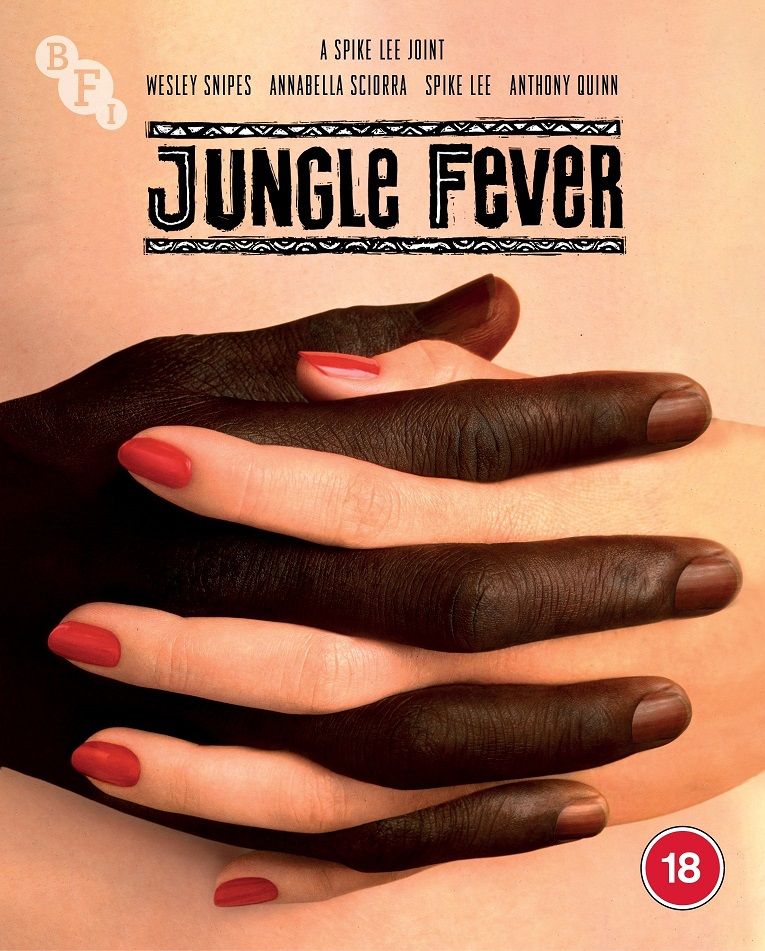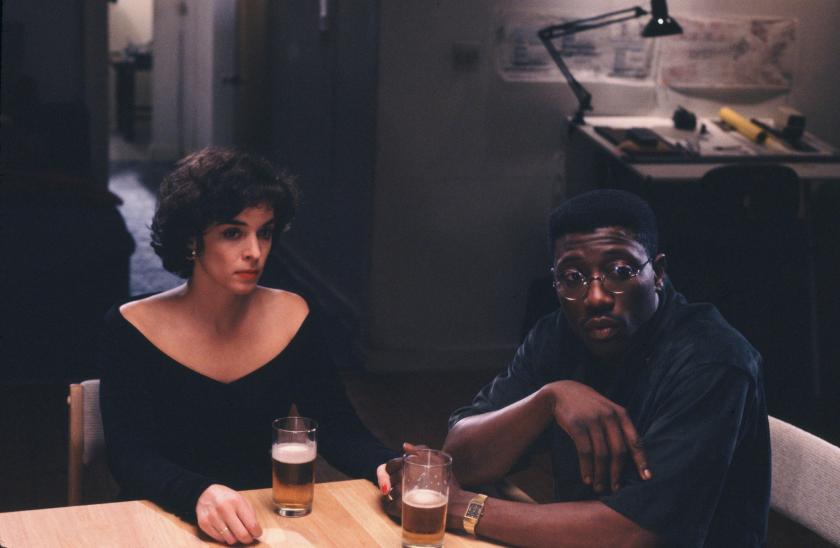Thirty years since its original release, Jungle Fever appears on Blu-ray for the first time, courtesy of the British Film Institute. Some aspects of the movie have aged well – it’s electrifying to revisit Samuel L Jackson’s breakthrough performance as a crack addict plumbing new depths to feed his habit. But other aspects haven’t fared so well, primarily the script’s sexual politics and the casting of Wesley Snipes as the (anti) romantic male lead.
Racial politics are the overt subject of Jungle Fever, a cautionary tale of a black man and a white woman having an affair. This is Lee at his most didactic, and no amount of Stevie Wonder on the sound track can leaven the messages being driven home. Irritated by critics’ accusations of latent anti-semitism in 1990’s Mo’ Better Blues, Lee focused his subsequent film on racial tensions between African Americans and Italian Americans.
Jungle Fever is prefaced with a dedication to Yusuf K Hawkins, killed by a white mob in Bensonhurst, which thought he was dating a local girl. The opening sequence is a fairly explicit erotic scene with Snipes as architect Flipper making love to his fashion-buyer wife Drew (Lonette McKee); in an adjacent bedroom, their very young daughter listens on, delighted by their sexual enthusiasm. Lee is presenting a successful, happy middle-class black family that wouldn’t look amiss in an adult sitcom, but the film's tone shifts rapidly in the next scene at Flipper’s work place.
The only black architect in the practice, he's requested a new assistant be a woman of colour, but has been ignored. His bosses have hired Angie (Annabella Sciorra), every inch the Bensonhurst girl. Flipper’s initial hostility turns into desire and after enough proverbial late nights and take-outs in the darkened office, he’s seducing Angie on the drawing board.
Drew finds out, throws her husband’s things onto the street, and calls her girlfriends for a session in which they share their rage about successful black men taking up with white women as trophies and how insulting it is to black women, especially the ones of darker complexion. That discussion of shadeism and interracial relationships as seen from a black female perspective was fresh in 1990 and still has a lot of impact today – possibly because a lot of the dialogue in the scene was improvised and drew on the assembled actresses’ own experiences.
 Many of the scenes set among Angie’s family and friends are too obviously a homage to Martin Scorsese’s Italian-American urban portraits, right down to the casting of many of his regular actors (Frank Vincent, Michael Imperioli, Joseph D'Onofrio). And these scenes are overtly schematic: John Turturro plays Paulie, Angie’s high-school boyfriend, who is kind but dull.
Many of the scenes set among Angie’s family and friends are too obviously a homage to Martin Scorsese’s Italian-American urban portraits, right down to the casting of many of his regular actors (Frank Vincent, Michael Imperioli, Joseph D'Onofrio). And these scenes are overtly schematic: John Turturro plays Paulie, Angie’s high-school boyfriend, who is kind but dull.
Paulie is bullied by his elderly father (a cartoonishly tyrannical Anthony Quinn) and belittled by Angie’s brothers. He sees a way out of his dead-end life when a smart black woman who buys her daily paper at the diner where he works encourages him to go to college.
While Lee allows Paulie to have aspirations and romantic dreams across the colour divide, Angie is portrayed as a girl mainly interested in transgressing her community’s racist taboos. Although Sciorra does her best to give her role more depth and plays Angie as a woman genuinely in love, Lee hasn’t allowed her much sympathy in the script.
As is often the case with Lee’s films, he tries to pack too much into one movie. Jungle Fever isn’t just about interracial relationships, it’s also about class, drugs, and the generational divide. Lee tackles the narcotic epidemic that wracked New York in the late '80s and early '90s with a vision of a crack den seething with addicts and noxious with fumes.
Samuel L Jackson, fresh from rehab for his own addictions at the time of filming, turns in a blistering performance as Flipper’s brother Gator. Halle Berry is almost unrecognisable in her first screen role as Gator’s girlfriend, selling sex for drugs. This desperate couple and Flipper and Angie are contrasted with Flipper’s ultra-respectable parents, played by the veteran actors Ruby Dee and Ossie Davis (married in real life). Davis is a retired Baptist minister outraged by his sons’ sins – there are echoes of Marvin Gaye’s shocking death as the action plays out.
This edition comes with a somewhat workaday commentary by Jim Hemphill; he focuses on relaying information from various books on Spike Lee without much original analysis. A short featurette made to promote the film on its original release includes interviews with Lee, Snipes, Sciorra, and Turturro.
Also on this Blu-Ray is an 80-minute recording of a 2009 onstage interview at the NFT, where Lee seems less than enthusiastic about being questioned by a rather beleaguered David Lammy. Their conversation focuses more on Lee's far better Do The Right Thing and doesn’t add much insight into Jungle Fever. Even quirkier as an extra is Top Deck, a 30-minute, dialogue-free, experimental drama about a British bus conductress and her African-American air force boyfriend made in 1962. Presumably it's included as a 'teaching aide' to show how portrayals of interracial romance have evolved over the decades, but it's no missing gem from the archive.















Add comment